I remember standing on a muddy jobsite, watching our crew waste two hours trying to position a roll off dumpster that just didn’t fit. That day costs us time, money, and patience.
That’s when I realized, choosing the wrong equipment isn’t just inconvenient. It hits the bottom line.
This guide was built from experience. We’ve worked with teams in construction, logistics, agriculture, and industrial sectors to understand what actually works in the field.
In this article, you’ll get:
- A straight-up comparison between dump trailers and roll off dumpsters
- Real-world scenarios to guide your choice
- Industry-specific recommendations you can act on
So, let’s start!
1. What Is a Dump Trailer?
Let’s start with the basics.
A dump trailer is a heavy-duty trailer designed to carry and unload bulk materials. What sets it apart is its built-in hydraulic lift system, which raises the bed so you can dump the load without manual labor.
You haul it using your truck, giving you total control over where it goes and when. It’s like having a mobile dumping solution on call whenever your operation needs it.
If you’re running projects across multiple locations, or if your team needs to stay light, fast, and flexible, a dump trailer might be the powerhouse you’re missing.
Common Use Cases
You’ll see dump trailers in action across dozens of industries, but here’s where they shine the most:
- Construction sites hauling gravel, sand, drywall scraps, and smaller debris loads
- Landscaping operations moving soil, mulch, and green waste across properties
- Agricultural work during harvests or cleanup, especially in fields with tough terrain
- Industrial use for quick material transfers between facilities or loading zones
From my own experience, I once used dump trailers from Rhinotrail to haul equipment between multiple micro-sites on a logistics job. It saved us from renting a second flatbed and kept us on schedule during a tight window. That kind of versatility pays for itself.
Best Features
Let’s break down what makes dump trailers a solid choice, especially if you value speed, autonomy, and flexibility in your operations.
- Self-Dumping: The hydraulic lift does the hard work your team doesn’t have to
- Towable With Your Trucks: No need to rely on outside haulers or delivery schedules
- Highly Maneuverable: Fits into tighter sites where roll offs can’t easily go
- Flexible Payloads: Great for mixed materials, tools, and even small machinery
- Fast Turnaround: Drop, dump, and get back on the road without waiting for a pickup
If you’re managing moving parts, tight timelines, or varied sites, a dump trailer can keep your team in control, not waiting around for the next container swap.
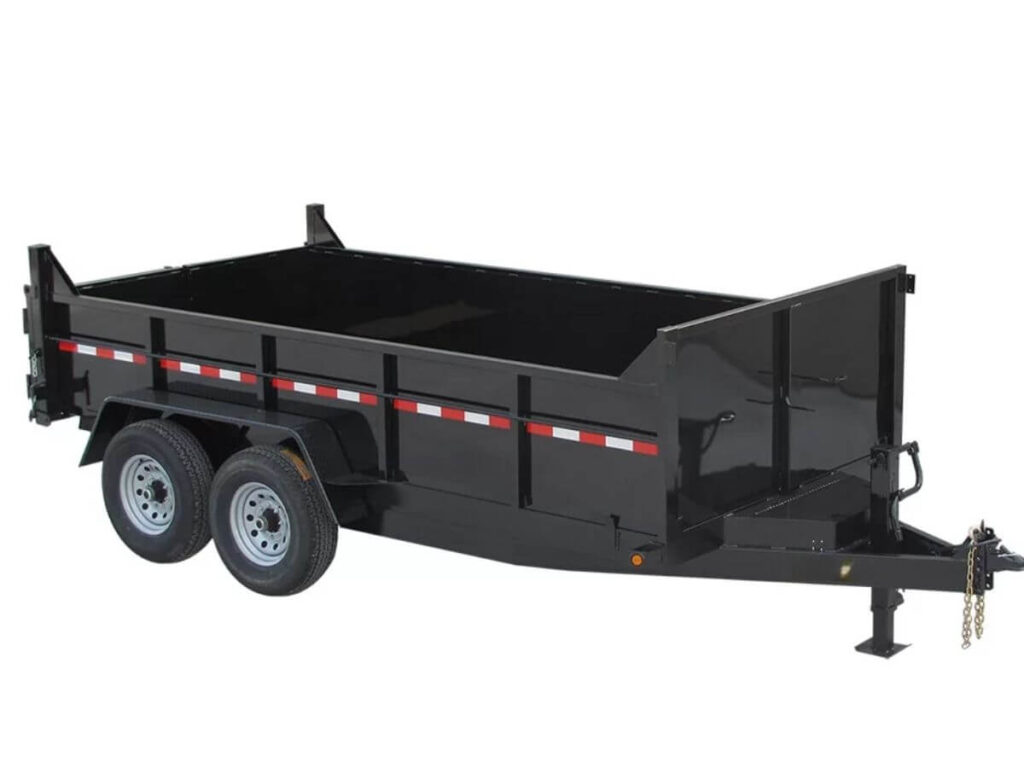
2. What Is a Roll-Off Dumpster?
You’ve seen them lined up on busy job sites, behind warehouses, or dropped next to demo zones. A roll off dumpster is a large, open-top container that’s delivered on a special truck and rolled off into place.
It doesn’t move once it’s dropped. It sits, handles the heavy lifting, and waits for you to fill it up—then the truck comes back, picks it up, and hauls it away.
It’s designed for volume, tough debris, and long-term placement. If your operation generates a lot of material fast and in one central location, this is the workhorse that can keep up.
Common Use Cases
Roll off dumpsters are the go-to solution when the job gets big, messy, or time-intensive. Here’s where they’re most valuable:
- Demolition sites handling concrete chunks, rebar, and framing
- Industrial cleanouts where waste piles up fast and keeps coming
- Retail or warehouse operations offloading packaging waste, old stock, or pallets
- Renovation and construction projects that span weeks, not hours
On one project I worked on, a commercial warehouse overhaul, we brought in multiple 30-yard roll offs and rotated them weekly. No delays, no overflow, no downtime. The site stayed clean, and the crew stayed focused. That kind of efficiency isn’t optional, it’s critical.
Best Features
If you’re running operations that demand scale and simplicity, a roll off dumpster delivers in spades.
- Massive Capacity: From 10 to 40+ cubic yards—built to handle the heavy stuff
- Low-Touch Logistics: Delivered and hauled away by a service provider, your crew stays on task
- Built for Tough Materials: Concrete, metal, demolition debris? No problem
- Extended Use: Ideal for jobs that span days, weeks, or even longer
- Permits Available Through Providers: Many vendors handle red tape for you
Roll offs are about setting it and forgetting it, so your focus stays on the job, not the mess.
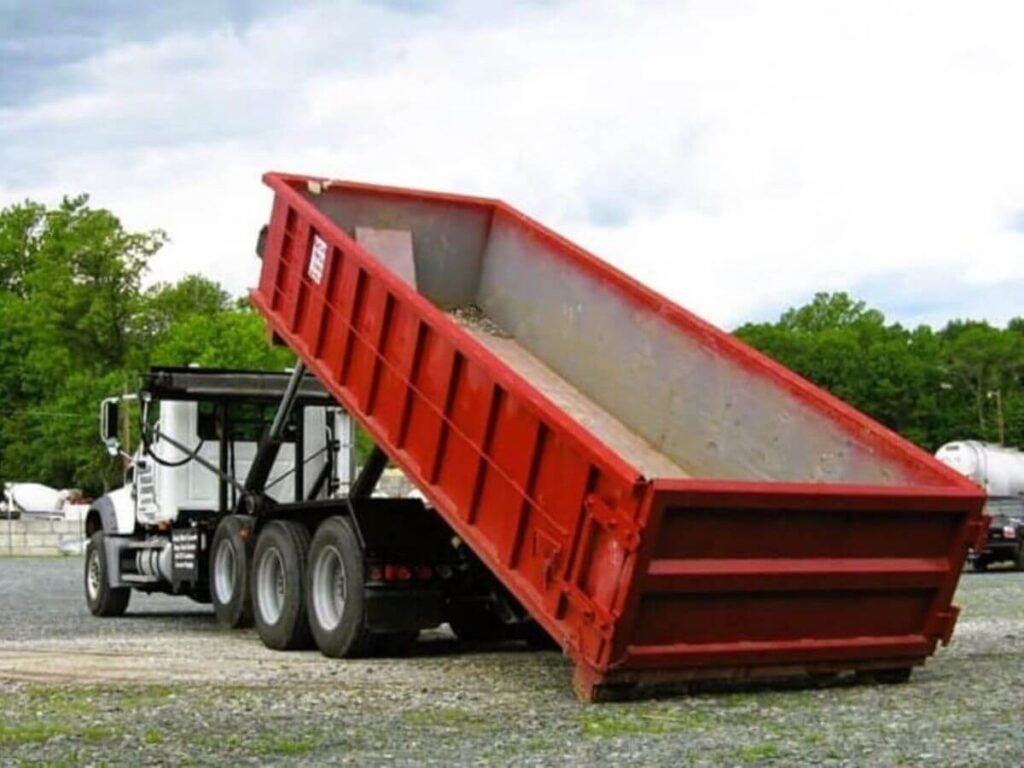
3. Mobility & Transportability
Let’s talk about movement, because when you’re running multiple jobsites, on tight timelines, across different locations, mobility isn’t a luxury. It’s survival.
Dump Trailer
A dump trailer gives you control. You hook it up to your own truck, tow it when and where you need it, and unload it on your schedule, not someone else’s.
You’re not waiting on dispatch. You’re not stuck behind a service queue. If a site wraps early or shifts unexpectedly, your team can roll out and keep working.
I remember working with a contractor who had 3 crews moving between new buildings in the same county. He used a pair of dump trailers like a tag team, one on the road, one in use. It gave him a serious edge over his competitors still stuck waiting on roll off swaps.
Key Mobility Benefits:
- Towable With Your Own Vehicle: No third-party scheduling required
- Quick Deployment: Move from one site to another in the same day
- Ideal for Remote or Tight Locations: Navigates easily through fields, farms, or dense jobsites
Roll Off Dumpster
Roll off dumpsters play a different game. Once placed, they’re not moving until they’re full and the hauler comes back. That’s not always a downside, but it does mean you’re locked into that location.
If you’re working a long-term project, that’s fine. But if you’re managing shifting sites, multiple phases, or job schedules that change by the hour, the wait time can cost you.
One client I worked with in the commercial demo space had to delay part of a floor teardown because the roll off company couldn’t swap bins until the next morning.
His crew sat idle for 5 hours. That delay? It wasn’t just frustrating, it was expensive.
Roll Off Limitations:
- Requires a Roll Off Truck to Move: No in-house control over transport
- Not Meant to Move Frequently: Best for static jobsites
- Dependent on Hauler’s Schedule: Potential delays in pickup or drop-off

4. Loading & Unloading Method
Loading and unloading sounds simple—until it eats up hours, frustrates your crew, or backs up your workflow.
Here’s how dump trailers and roll off dumpsters stack up when it comes to getting material in and out, fast.
Manual vs. Hydraulic Dumping
- Dump Trailer: This is where the dump trailer earns its name. With the push of a button, the hydraulic system lifts the bed, and gravity does the rest. No need for loaders or extra hands. Just dump and go.
- Roll Off Dumpster: There’s no self-dumping here. Debris stays put until it’s picked up and emptied by the hauler. If you’re clearing materials throughout the day, you’ll need loaders or manual labor to keep things moving.
Equipment Required
- Dump Trailer: All you need is a truck with the right towing capacity. Your crew can handle loading with skid steers, shovels, or compact equipment.
- Roll Off Dumpster: You’ll often need larger equipment—like front loaders or excavators—to fill these containers, especially on bigger jobs. And when it’s full, you’re calling the hauler for the swap.
Speed and Efficiency
- Dump Trailer: The turnaround time is fast. Load it. Dump it. Be back in 30 minutes. Perfect for fast-moving sites and smaller, repeat hauls.
- Roll Off Dumpster: Great for volume, but not for speed. Once it’s full, you wait for the truck to come get it. That downtime? It adds up.
I’ve seen teams lose full afternoons waiting for a roll off pickup, while a trailer crew across town knocked out two sites before lunch.
Crew Labor and Workflow Impact
- Dump Trailer: With fewer moving parts and faster dumps, your crew stays in rhythm. Less bottleneck. Fewer breaks in flow.
- Roll Off Dumpster: There’s more labor involved, especially if you’re not using machines to load it. It can pull workers away from other tasks just to fill it properly.
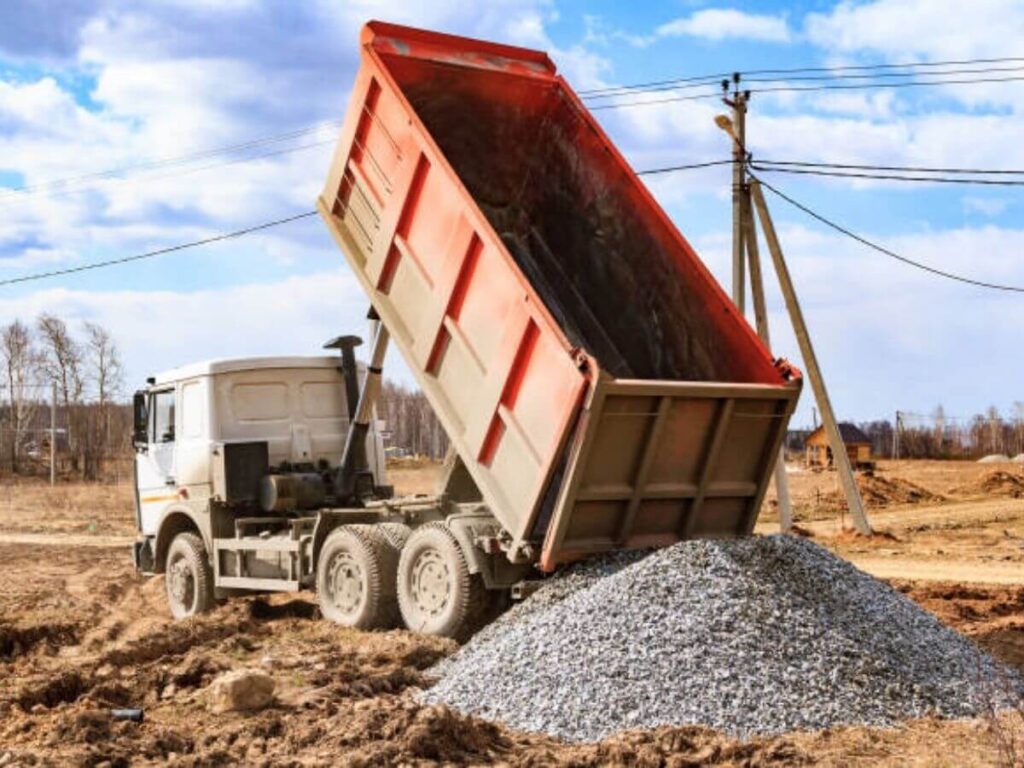
5. Size & Capacity Options
Size matters, especially when you’re dealing with waste, debris, or raw materials that just keep coming.
Choosing the wrong capacity can leave your crew scrambling mid-job or overpaying for empty space. Let’s break it down:
Dump Trailer
Dump trailers from Rhinotrail typically come in sizes ranging from 5 to 20 cubic yards. That might sound small compared to dumpsters, but don’t underestimate them.
They’re designed for multiple trips, quick turnarounds, and more mobile loads. If your team is handling lighter materials like soil, mulch, or mixed construction debris, a mid-size dump trailer might be all you need.
Here’s the sweet spot:
- 5–10 Yards: Great for landscaping or smaller construction tasks
- 12–16 Yards: Ideal for general contracting, roofing jobs, or farm use
- 20 Yards: Maxes out most trailer setups—good for serious hauling without oversizing
I once saw a crew split their day using 2 14-yard dump trailers to cover three properties. They never once had to stop to wait for a pickup, and they finished the job a full day early.
Roll Off Dumpster
Now, if volume is the priority, roll off dumpsters are heavyweight champs.
These giants range from 10 to 40+ cubic yards, and they’re built for bulk. Whether it’s a major demolition project or a warehouse cleanout, they can handle everything you throw at them, literally.
Here’s the typical breakdown:
- 10 Yards: Small renovations or concrete cleanups
- 20 Yards: Mid-size construction and roofing jobs
- 30 Yards: Commercial projects, large renovations
- 40 Yards: Full-scale demos, industrial waste, or bulky items like pallets and fixtures
The thing to know? You only get one shot per fill. Once it’s full, you call for a new one. So, if your load size is unpredictable or if you’re spread out across sites, that can slow things down.
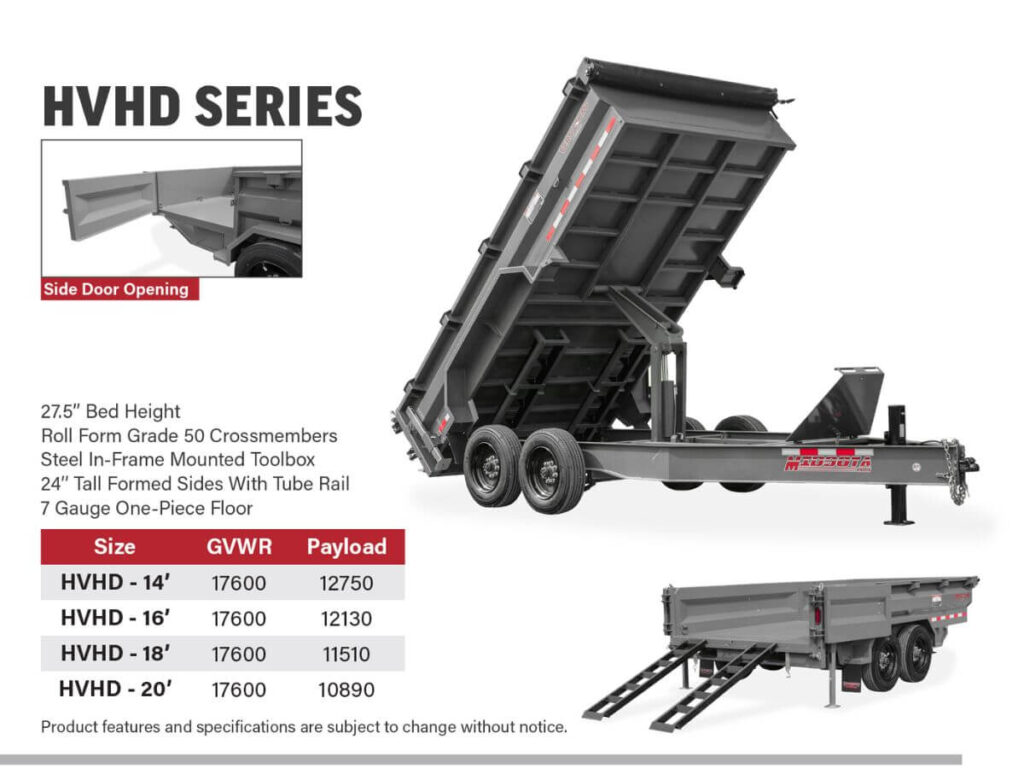
6. Cost Considerations
Cost is more than just a line item, it’s a reflection of your pace, priorities, and how your team operates in the field.
Let’s dig into the real financial differences between dump trailers and roll off dumpsters, so you’re not just comparing prices, you’re calculating ROI.
Upfront Costs: Ownership vs. Rental
Dump Trailer: Buying a dump trailer means a larger initial investment. You’re typically looking at:
- $$8,000$$20,000+ depending on size, axle count, and hydraulic setup
- Additional cost if you don’t already own a tow-capable truck
But once it’s yours, it’s yours. No recurring rental fees. No per-use charges. That’s long-term value if you’re using it weekly or across multiple projects.
Roll Off Dumpster: With roll offs, you’re paying for acces, —not ownership. That keeps the upfront cost low, but adds up quickly:
- $$300$$800 per drop, depending on region, container size, and type of waste
- Expect separate charges for delivery, pickup, and overage (weight or time)
If you’re doing short-term or one-off jobs, roll off rental wins. But over time? That cost scales hard.
Operational & Logistical Costs
Dump Trailer: You control the transport, which means:
- No waiting on third-party haulers
- Fewer job delays = reduced labor waste
- Lower cost per load when used efficiently
You will, however, pay for things like:
- Fuel
- Truck maintenance
- Occasional hydraulic or tire service
Still, if you’re doing multiple loads per week, the per-load cost stays low.
Roll Off Dumpster: You’re paying for convenienc, but it can cost you control. Logistics are handled by the rental company, but:
- Wait times can lead to downtime
- Pickup delays can stall progress
- Additional trips = more charges per container swap
And if you misjudge the size needed? You’ll pay extra to haul off a half-full bin—or for a second one.
Usage Frequency & Long-Term ROI
Dump Trailer: The more you use it, the cheaper it gets, period. If you’re running:
- Recurring projects
- Jobs across multiple locations
- Hauls that need same-day turnaround
Owning a trailer is a strategic asset. Many businesses recover the full cost within 6–12 months of consistent use.
Roll Off Dumpster: Roll offs work better for:
- Long-term, high-volume projects
- Static jobsites
- Teams that don’t want to manage their own disposal process
But if you’re renting monthly or more? That convenience will start eating into your margins.
Hidden & Variable Costs
These are the costs that sneak up on you.
Dump Trailer:
- Insurance (if owned by your company fleet)
- Registration/titling
- Employee training for safe towing and dumping
But most of these are predictable and controlled in-house.
Roll Off Dumpster:
- Permit fees if placed on public streets
- Overage charges for exceeding weight limits
- Trip fees if the hauler can’t access the site
- Rental extensions if the project runs longer than expected
I’ve seen teams get hit with $150–$300 in surprise fees simply because the driver couldn’t access a narrow jobsite on time. That’s real money, and preventable with the right equipment.

7. Industry-Specific Recommendations
No two industries operate the same, and neither should your disposal setup.
Whether you’re hauling concrete, compost, packaging waste, or scrap metal, the right choice depends on how you work, where you work, and how often you’re moving materials.
Here’s how dump trailers and roll off dumpsters stack up across key industries:
Construction & Demolition
Recommended: Roll Off Dumpster
- You’re generating heavy, bulky debris, fast.
- Jobsites are often stationary for weeks, making roll offs the more efficient choice.
- Haulers handle the mess, so your crew stays on task.
If you’re on a long-term build or tear-down, roll offs help you keep waste under control without the added logistics.
Agriculture & Landscaping
Recommended: Dump Trailer
- You’re working in the field, often across multiple locations in one day.
- You need to haul everything from mulch and manure to harvest debris.
- Dump trailers are easier to maneuver on uneven or muddy terrain.
I’ve seen farmers use them during harvest season, making multiple trips a day, zero downtime, maximum output.
Manufacturing & Industrial
Recommended: Roll Off Dumpster
- You’re dealing with consistent waste streams from production lines.
- Waste tends to be dense, heavy, or irregularly shaped (metal scraps, pallets, etc.)
- On-site roll offs offer a set-it-and-forget-it solution.
Manufacturers benefit most when they can focus on throughput—not transporting waste every day.
Logistics, Warehousing & Distribution
Recommended: Roll Off Dumpster (With Occasional Trailer Use)
- Roll offs handle volume-heavy packaging waste like cardboard and plastic wrap.
- For internal moves or location swaps, a dump trailer helps keep overflow under control.
Many warehouse ops use both: a dumpster outside for ongoing loads, and a trailer to clean up after peak shipping periods.
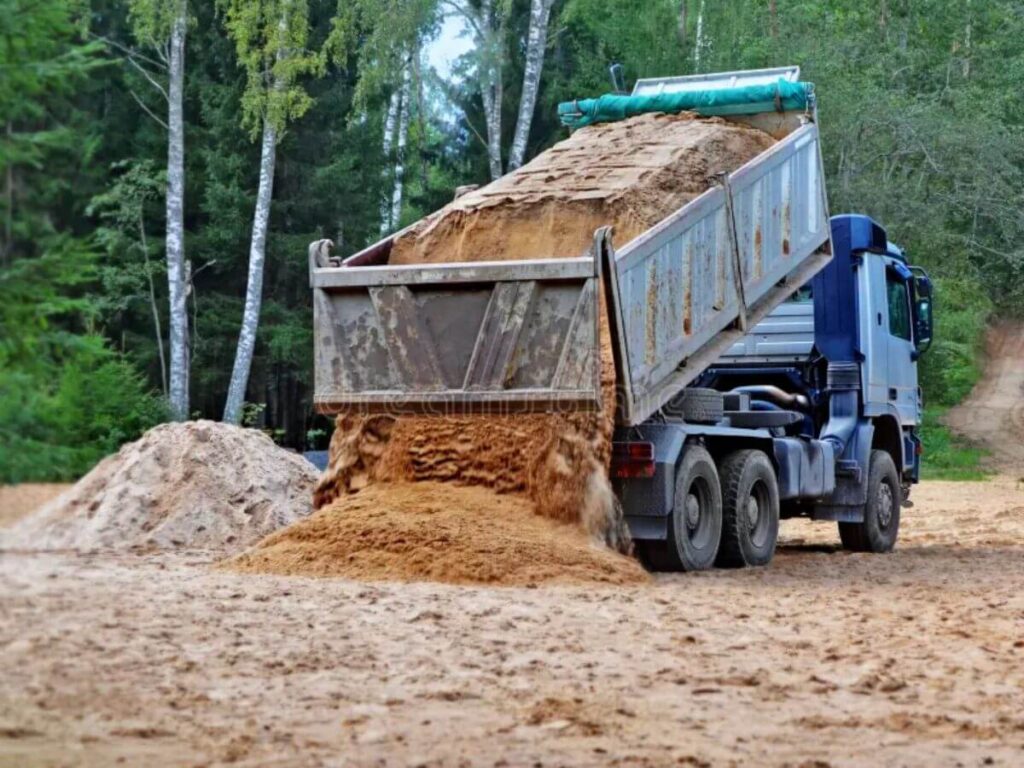
8. How to Choose the Right Option for Your Needs
At this point, you’ve seen the facts. But let’s bring it home—how do you actually make the right call for your team, your projects, and your budget?
Whether you’re hauling demo debris across a city or farm waste across a field, here’s how to choose the solution that makes sense for how you work.
Job Type and Frequency
Ask yourself:
- Do we handle waste or materials daily, weekly, or just occasionally?
- Are our jobsites fixed or constantly changing?
Choose a Dump Trailer if:
- You work multiple small-to-mid size jobs regularly. Your crews need mobility and speed. And you want long-term ROI through ownership.
Choose a Roll Off Dumpster if:
- Your project is long-term, large-scale, or static. You need high capacity with minimal hands-on effort or you’re okay relying on a hauler’s schedule.
Material Type and Volume
Be honest, how much are you hauling, and what is it?
Go Dump Trailer if you’re moving loose, lighter material (mulch, soil, roofing tear-off). You want flexibility to do multiple smaller loads a day or you want the freedom to dump on your own time.
Go Roll Off if you’re hauling bulky, heavy materials (concrete, metal, demo waste). You need to contain high volumes safely on-site. You prefer a set-it-and-forget-it system.
Budget and Long-Term Value
Your budget isn’t just about today—it’s about every job after this one. Own a Dump Trailer if you want control, repeat value, and fast ROI. Rent a roll-off dumpster if your usage is low-frequency or short-term. Consider both if your operation scales between fast-moving teams and big, ongoing jobs.
Conclusion
Back on that muddy jobsite, we finally swapped that bulky roll off for a dump trailer. It changed everything. Less waiting, less stress, more control.
In this guide, you learned the real differences, what each tool does, when it works, and why it matters.
Now it’s your move. Think about your crew, your jobs, your pace.
Whatever the answer, you’ve got options, and you’re not guessing anymore.
Contact us today and let’s find the setup that works for how you work.


